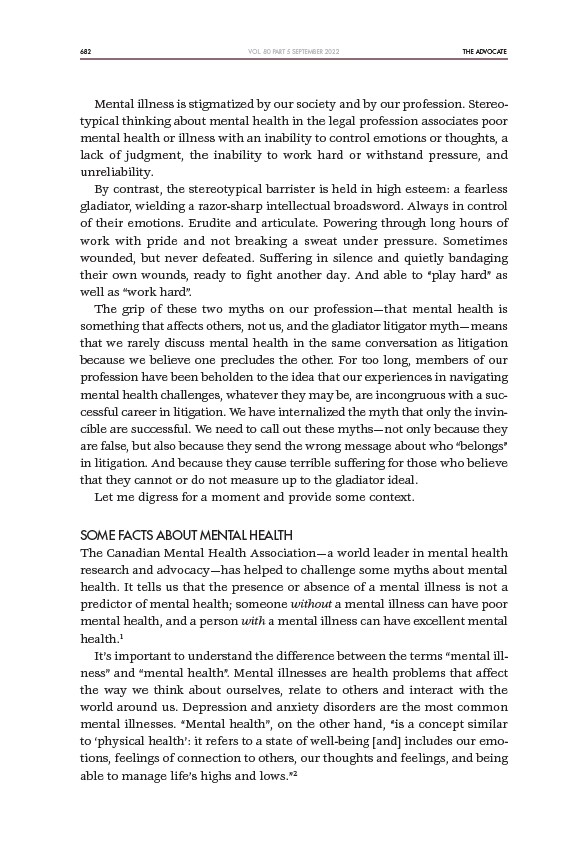
682 THE ADVOCATE
VOL. 80 PART 5 SEPTEMBER 2022
Mental illness is stigmatized by our society and by our profession. Stereotypical
thinking about mental health in the legal profession associates poor
mental health or illness with an inability to control emotions or thoughts, a
lack of judgment, the inability to work hard or withstand pressure, and
unreliability.
By contrast, the stereotypical barrister is held in high esteem: a fearless
gladiator, wielding a razor-sharp intellectual broadsword. Always in control
of their emotions. Erudite and articulate. Powering through long hours of
work with pride and not breaking a sweat under pressure. Sometimes
wounded, but never defeated. Suffering in silence and quietly bandaging
their own wounds, ready to fight another day. And able to “play hard” as
well as “work hard”.
The grip of these two myths on our profession—that mental health is
something that affects others, not us, and the gladiator litigator myth—means
that we rarely discuss mental health in the same conversation as litigation
because we believe one precludes the other. For too long, members of our
profession have been beholden to the idea that our experiences in navigating
mental health challenges, whatever they may be, are incongruous with a successful
career in litigation. We have internalized the myth that only the invincible
are successful. We need to call out these myths—not only because they
are false, but also because they send the wrong message about who “belongs”
in litigation. And because they cause terrible suffering for those who believe
that they cannot or do not measure up to the gladiator ideal.
Let me digress for a moment and provide some context.
SOME FACTS ABOUT MENTAL HEALTH
The Canadian Mental Health Association—a world leader in mental health
research and advocacy—has helped to challenge some myths about mental
health. It tells us that the presence or absence of a mental illness is not a
predictor of mental health; someone without a mental illness can have poor
mental health, and a person with a mental illness can have excellent mental
health.1
It’s important to understand the difference between the terms “mental illness”
and “mental health”. Mental illnesses are health problems that affect
the way we think about ourselves, relate to others and interact with the
world around us. Depression and anxiety disorders are the most common
mental illnesses. “Mental health”, on the other hand, “is a concept similar
to ‘physical health’: it refers to a state of well-being and includes our emotions,
feelings of connection to others, our thoughts and feelings, and being
able to manage life’s highs and lows.”2